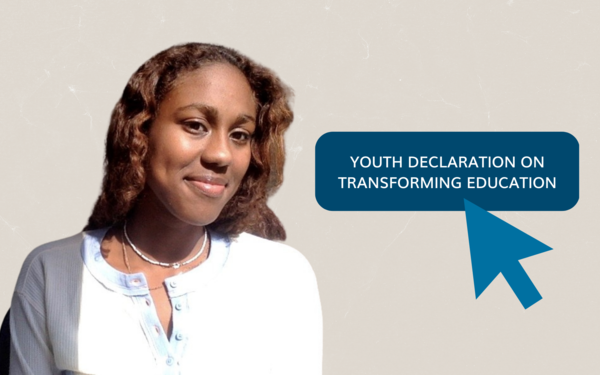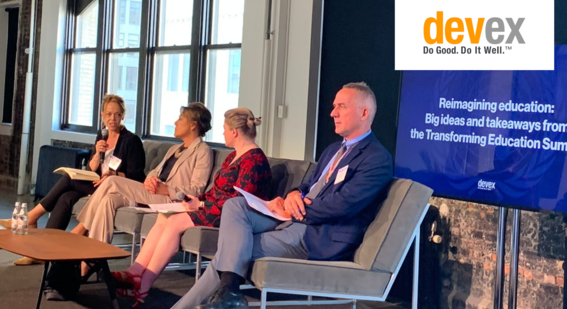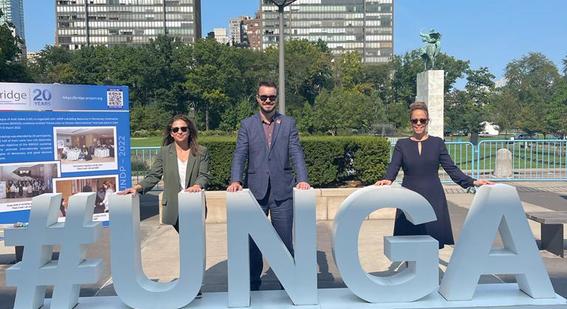Listening to young people post-Transforming Education Summit
One of the big takeaways of the Transforming Education Summit in New York in September 2022 was the importance of truly listening to young people. Here, UNICEF Youth Mobilisation Laboratory delegate Sakiye Boukari shares her reflections on the event and the further questions it raised for her.
The views contained in this blog are those of the author and do not necessarily reflect the views or positions of Cambridge Partnership for Education.

I was invited to the first-ever UNICEF Youth Mobilisation Laboratory at the Transforming Education Summit in September. As the name indicates, the laboratory meeting was experimental. Many young people, involved with UNICEF in their countries, from all over the world gathered in New York City. Young activists from Poland, Ireland, Indonesia, Malawi, Bangladesh, Senegal, Sudan, Trinidad, Jamaica, Barbados, Sweden, Iraq, UAE, Norway, Tanzania, Luxembourg, Romania, Bulgaria, and the USA. For most of us, this was our first-ever visit to the United States.
Involving youth in the conversation
The Youth Mobilisation Day at the Transforming Education Summit left me with great impressions. What I noticed immediately and what brought me joy was the number of youth on stage in leading positions. I was impressed and felt encouraged to see young people within the Transforming Education Summit, not only as consumers of the information that we gather but also as involved actors, moderators, experts, discussion leaders, and artists. The diverse representation of youth, from all over the world in many positions is a great step toward truthful youth engagement.
The issue of involvement is what young people have been stressing about the most and can be seen in the first demands of the youth declaration. The goal of transforming education is to start tackling the tumultuous, ongoing crises we face in the world. Humanising schools by listening to students was advocated by Mr. João Marques da Costa, Minister of Education from Portugal, supported by his statement that reflecting plus action, equals transformation. These are simple words but make great sense and should not be neglected. I appreciate the use of simple phrases that are easy to comprehend because, in the end, we want to spread our demands for education and bring them out of the United Nations Head Quarters conference room.
Actual “good practices” were mainly brought up by youth leaders. We heard about good practices for educational councils, awareness films, and demands about the accountability of decision-makers and radical inclusion of youth. For me, this is proof of the energy, great ability, and ideas young people have, alongside the time pressure they experience. Listening was good but the event was somewhat non-participatory for people who have not been invited by UNESCO and the Transforming Education Summit directly for speaking opportunities, at least up until the breakout sessions.
Maintaining focus on youth contributions
For the unofficial handover of the youth declaration, there was just one minute to pitch the whole content of the youth declaration. This did not do the youth declaration any justice. I began to wonder how can we keep track of what is happening with the youth declaration? Later, the official handover of the youth declaration took place, and another form of dialogue together with António Guterres, Secretary-General of the United Nations.
Questions post-Summit
During the Youth Mobilisation Day education, and especially Sustainable Development Goal 4, was the focus. I wonder whether the Transforming Education Summit left me with more questions than answers. I see and recognise the need for immediate, rapid change to face this educational crisis, but the issues in this world are so different. Every country, every society, and every city has different problems, resources, and perceptions of education. Here, in the Summit we might agree on the issues but how can we ensure sustainable change outside of this building and convince those who are not convinced yet that this challenge needs youth engagement on every level? Where can young people get more support within their countries or build alliances and networks beyond the nation's borders? Though I joined as a former member of UNICEF Germany’s National Youth Council, there was no ministerial representation from my country. I hope the Summit, UNESCO and young people can mobilise more authorities. However, I must admit the participation in this event and the following days with UNICEF activities gave me new motivation to again find a specific area where I feel like I could bring change – gather my sources, my network and tackle issues on a small scale, one step towards a global change in educational equity.
Inspiring one another
My outcome came mainly from the UNICEF Youth Mobilisation Lab after the Transforming Education Summit. Despite how great an event in New York City might be, especially hosted by UNESCO, what impacts others, in my opinion, are the people and connections, conversations among them, working, reflecting, and inspiring each other. Spending time during and after the programme with a similar group of people allowed me to get to know them better and based on that, brainstorm more in detail about how we can further collaborate on our engagement. The event is about education, about learning. I always expect to learn something wherever I go and the Transforming Education Summit did not fail to teach me something. I got clarity about my wants, new questions I need to continue my activism, and new resources and ideas about a further exchange. I am curious as to in which dimensions this event will grow in the future.
About the author
Sakiye Boukari is a 19-year-old activist and first-year student at Maastricht University. Her social engagement sparked after being elected to UNICEF Germany’s National Youth Council where she was active for almost two years. Afterwards, Sakiye was involved in many organisations tackling issues from education in post migrant societies, to discrimination and children’s rights. Further enhanced by the role of one of the German EU youth delegates for the EU youth dialogue. She believes that there are many brilliant and innovative ideas from young people to tackle current global issues and it is long overdue to seriously acknowledge those voices.




